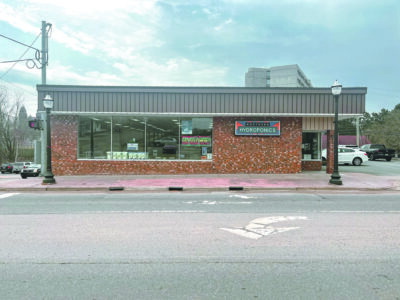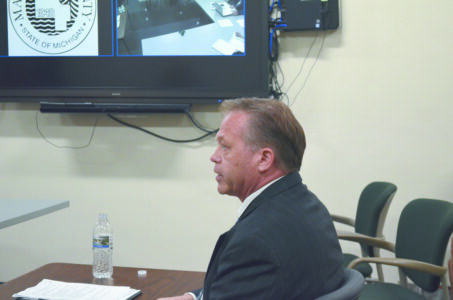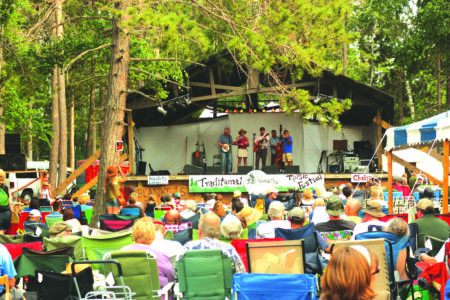‘Re-making’ bank
Redevelopment proposed for downtown Marquette Savings Bank Building

A rendering of a proposed development, The Vault Hotel, in downtown Marquette is shown in a view from Lakeshore Boulevard. The 92-room boutique hotel would make use of the historic Marquette Savings Bank Building at the corner of Washington and Front streets, while preserving the structure’s original design. Other components of the development include residential units, a public parking structure, event space, commercial storefronts, a makers space, pedestrian connections between the downtown area and the waterfront, and place-making opportunities. (Rendering by Barry J. Polzin Architects)
MARQUETTE — Major plans may be on the horizon for a historic building in downtown Marquette.
The Savings Bank Building, located at the corner of Washington and Front streets, may soon be redeveloped into a 92-room hotel.
The project, which would be known as The Vault Hotel, is being proposed by Houghton-based development firm Braveworks.
Braveworks owners Jen and Jon Julien, along with lead architect Barry Polzin, were on hand to discuss the project at a Marquette City Commission work session on Monday night. The redevelopment would also feature residential space to the south and a 220-space public parking ramp on the same parcel of land, all while preserving the Savings Bank Building’s pristine and historic look.
“We were really excited when we saw the Savings Bank come forward as an opportunity for us, as it has a similar historic story where banks were built at the center of downtown, they were built for the community, and they were really establishing for the community to say ‘This is where we’re going to stay, we’re going to be a community forever,'” Jen Julien said. “The Marquette Savings Bank preservation and renovation will enhance and expand the vitality of downtown Marquette. We’ve talked to the neighbors, and they’re excited about the opportunity of having people right here in the heart of downtown, and The Vault Hotel will provide a memorable experience that resonates with travelers and adds to the connectivity with downtown businesses and the waterfront.”
Other components of the proposed development include event space, commercial storefronts, a makers space, pedestrian connections between the downtown area and the waterfront, and placemaking opportunities. The iconic clock that sits atop the structure would also be restored to working order.
“As we all know and love Marquette, its historic buildings are such a good part of it,” Polzin said. “The Savings Bank being the really premier building of all. It’s really the icon of downtown Marquette, so this is just a great opportunity to preserve this wonderful (building), and also make use of this beautiful property that’s included with it.”
The Savings Bank Building was built in 1892 at a cost of $174,000, according to archives from the National Register of Historic Places. The Marquette County Savings Bank itself was founded in 1890 by several Marquette-area businessmen. Within four months of its opening, leadership decided that a permanent bank building was necessary after a rapid growth in the bank’s membership.
“During the late 19th century, the city of Marquette was one of the leading communities of the Upper Peninsula,” the archive states. “By the time of the Savings Bank’s organization in 1890, the town was emerging from a major building and population boom and had become the leading port for shipping the rich iron deposits of the Marquette Range. The new financial institution was a reflection of these favorable economic conditions.”
The building’s original design featured “rock-faced sandstone with smooth-cut jambs, above that the lintels and sill courses will be of smooth-cut stone and the rest pressed brick,” according to a Journal article from April 18, 1891. “Between the windows of each story from bottom to top will be a carved stone panel and all the ornamentation in the block will be carved of stone.”
The building was added to the National Register of Historic Places on Sept. 13, 1978.
Braveworks took inspiration for the downtown Marquette project from a similar development in Houghton.
The Vault Hotel in Houghton, located along Shelden Avenue in the heart of downtown, opened in September 2019 in the historic Houghton National Bank building, opened in 1887.
After the Juliens and Polzin made their case to Marquette city staff and the commission, commissioners mostly expressed support for the project, but noted some potential hurdles.
“This project is very ambitious,” Mayor Jenna Smith said. “I see it as a positive project potentially in the city of Marquette. Increased density is something that we are looking for and you included a lot of the hot items that we need in the city of Marquette. So it’s definitely encouraging to see, but it’s going to take me a little bit of time to wrap my head around this. I didn’t think it was quite as big of a project coming into (tonight) as what I just saw. So I need some time to sit with those slides, to walk around the property, and I see that we may have this down as an agenda item in a couple of weeks, and I’m feeling a little anxious about that.”
“I am very, very intrigued by this,” Commissioner Cody Mayer added. “It seems like a great project. Looking at this, there’s so many things I would want to see in a larger scale development, and it seems like you put so many of the things that we’ve been identifying as priorities. It makes me kind of feel like this could be a legitimate partnership pursuing something like this. That’s just my kind of open take and perspective on this.”
The development will require a brownfield plan through the Marquette Brownfield Redevelopment Authority, and Commissioner Fred Stonehouse shared his concerns about the many projects already in the works through the MBRA.
“We’re very close to what we can bond in terms of brownfield support, and we do have other projects out there we know are coming up such as the potential reuse of the hospital, the old Shopko-area property, and certainly the Cliffs-Dow property,” he said. “So I am very concerned with the amount of money that we would have to bond for as a city.”
Stonehouse also expressed his concerns on when the city would receive any tax revenue from the development, which would be 25 years after the start of the project.
“One element is that currently, those taxes go to the DDA (Marquette Downtown Development Authority),” said Mac McClelland, brownfield consultant for MBRA. “So depending on the extension of the DDA, its time frame and taxes from the financing plan, that’ll be the case. It’s a long-term plan. Given the amount of investment and the public infrastructure, it would be a long-term plan.”
“So we’re really doing this for the DDA less than doing it for the city?” Stonehouse asked. “I’m drawing a distinction as to who’s got the pot of money.”
Polzin responded by commenting on the economic impact the city would receive from the project.
“The other economic element here is what this will do for downtown Marquette,” he said. “We met with (nearby restaurants) The Vierling and Elizabeth’s (Chop House), and they’re ecstatic about this because we’re going to put guests next door to them. And by providing the parking, we all know what happens here. People love to congregate by the harbor, so the economic spinoff that occurs from this investment is very, very strong. And that benefits everyone. It benefits the community, and it increases the taxable value of all the other properties. There’s a direct benefit that comes much sooner than the end of the brownfield.”
The Juliens said that if the development is approved, they expect construction to commence in late fall of this year or early spring of next year, with an 18- to 24-month construction period.
Monday’s work session was strictly informational and served as an introduction to the development. A brownfield plan will be up for consideration at the MBRA meeting Thursday. The city commission will likely be asked to establish a public hearing at its next regular meeting on May 24, which would then be held at its June 14 meeting, the same meeting the brownfield plan will tentatively be under consideration for approval.
For more information on Braveworks and its previous developments, visit www.thebraveworks.com. Monday’s work session can be viewed in full on YouTube at https://youtu.be/o-rBqMwbGhI.






